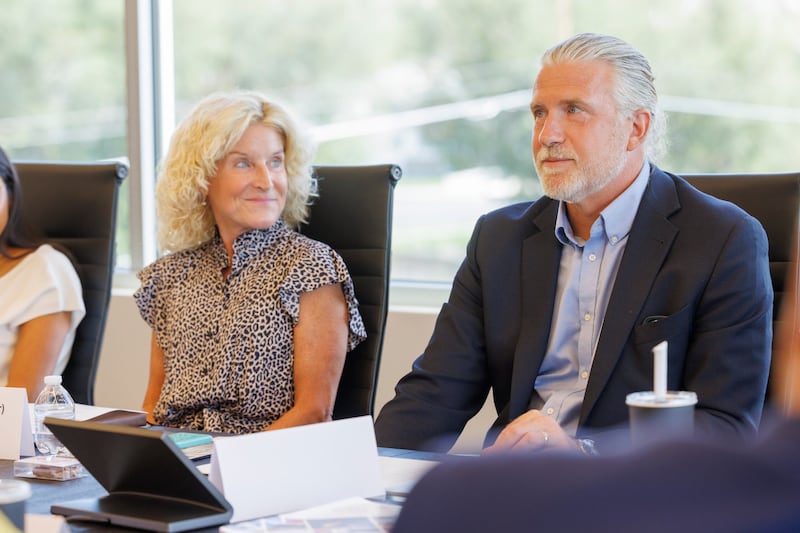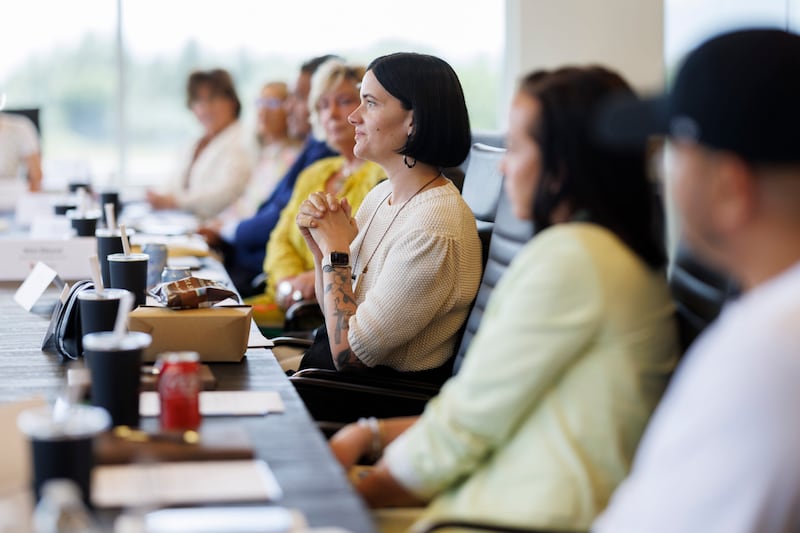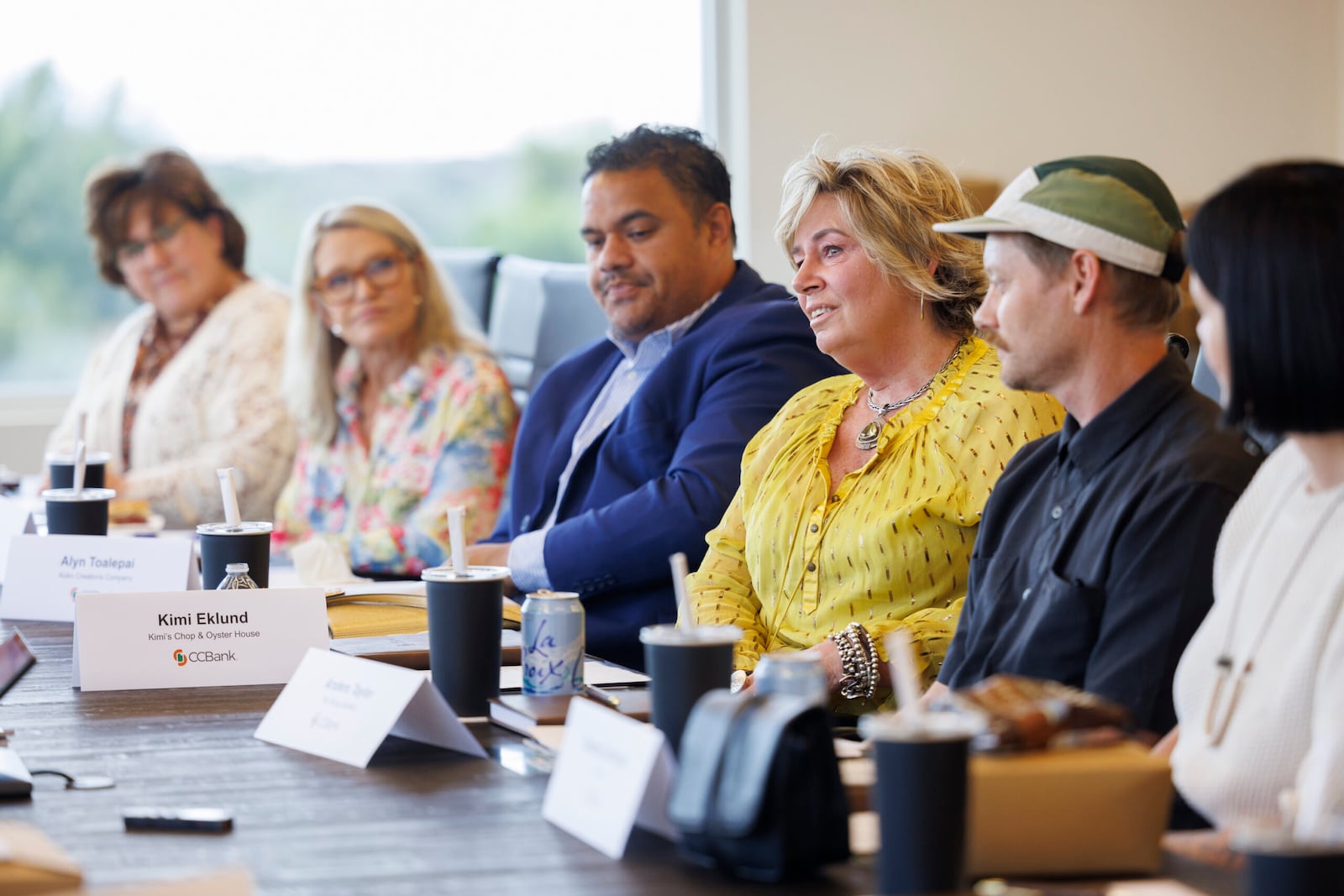(SBA), participants discussed the first steps for starting a small business, the challenges of accessing capital, having an endurance mindset and more.
As a new small business, what did you need to know? What were some of the first steps you took?
Kimi Eklund | Restaurateur | Kimi’s Chop and Oyster House
One of the most important things to learn about was the different financing options available as a private individual, and one of them, obviously, was the SBA. That was one of the first things we did — we made contact with all the banks. … We forged relationships with bankers so that, when we needed to have the opportunity to take out a loan, we had already made friends with people.
Rowena Montoya | Owner | JulieAnn Caramels
I started making caramels for [my husband] as we traveled all over the United States. That’s how my business started, literally, with a partner sitting in my basement, then to a manufacturing plant, and figuring it all out with the help of lots of classes. … I think it’s [about] taking classes and being around people who will help you grow and who are smarter than you are in the areas that you need help with. You can be great, creative and bootstrapped, which I’m still doing.
Oliver Ford | Director, Sales | Beehive Cheese
We went to the state health department to have them help design our [cheesemaking] room. We went to Utah State University with their dairy science and Gossner Foods with their cheesemaking. We asked a lot of people in the industry, “How do we get started?” The biggest advice we got was, “Make sure you have enough space.” We’re on our fourth or fifth expansion, so we must not have taken that seriously.
Michael Wunderli | Co-Founder & Managing Partner | WW Partners
Co-Founder & CEO | Savant IQ
When I advise small businesses and startups, there are always three positions I’m recommending: One is a plug for attorneys; … it’s better to have them up front protecting you. … The second position you should rely on is an accountant. … And the third one is an insurance agent; they can show you the spots that are risky. … One incident, one fire, one worker’s comp claim can actually destroy your entire business. Making sure that those three positions are the ones that you’re often going for right at the outset can help protect your business long-term and help it actually facilitate growth.
Memo Ruiz | Founder & Principal Talent Partner | RRC
When I started this business, one thing I needed to know was what resources I had as a business owner: legal help, financial help, website. … Utah.gov has amazing resources when it comes to starting a small business.
Patrick Ramsay | Founder | Happy Magpie Book & Quill
Startup.utah.gov, that new initiative, has everything. When I saw that, I was like, “Oh, my gosh! This is the list of stuff I genuinely needed so badly,” and now I see how it’s supposed to be done. … Knowing that there are resources like the Startup Initiative here in Utah would’ve been massively helpful. Anytime anyone in my community asks me about starting a business, I recommend they go to that website.
Chase Murdock | CEO | Decada Group
This is actually a message of hope for small businesses: You don’t need to have it all figured out from day one. … There are a lot of resources when you start to reach out in the community. The takeaway I like to offer those thinking about getting into entrepreneurship is that you don’t need to have it all figured out or have that 110 percent confidence in order to jump in. There’s a lot of opportunity to learn by doing.
Jason Glade | CEO & President | Taffy Town
If you understand why you’re doing things and what your passion is for doing it, you’ll figure it out. Adversity is not a bad thing. … It teaches you who you are and helps you find resources that you maybe wouldn’t have found otherwise. … Just remember who you are and why you’re doing what you’re doing, and always go back to those roots. It’s going to help you and your business throughout its journey.
Alyn Toalepai | Co-Owner | Koko Creations Company
I started my cocoa company, and I’ve opened six companies since because of the networking I had prior. … You don’t need to know anything. You need to find the people who know and are there to help you. … I’ve always pitched that if there’s a table that you don’t have a seat at, create your own table.

With your limited time and budget, what conferences, trainings or events have you found the most useful and beneficial?
Kimi Eklund | Restaurateur | Kimi’s Chop and Oyster House
I joined the Goldman Sachs 10,000 Small Businesses program. … It makes you think about things that you haven’t thought about necessarily in a long time. It’s like a mini MBA. … Through that, they introduced me to the James Beard Association, and I was able to take their program at Babson College. It’s networking. You meet the right people and they put you in line with other things.
Gaya Samarasingha | Founder & CEO | Kalaia
One of the most underutilized tools is LinkedIn. I can’t recall how many people I have reached out to on LinkedIn: CEOs, founders, multi-billion dollar company executives. … People have been so gracious to give me their time. … If somebody reaches out to me on LinkedIn, I’m more likely to give them the time than a message that I get on Facebook or Instagram.
Denise Cartwright | Founder & CEO | CRUDE
I didn’t go to college. I always say I went to “the university of YouTube” to start my business, but now more than ever I’m using ChatGPT. … I do not have a mind for finances. I can just ask [ChatGPT] stupid questions and give it all my numbers, and it can break it down for me. For projections, basic legal work or website issues, ChatGPT is such an incredible resource for businesses.
Chase Murdock | CEO | Decada Group
[It’s] a very lonely journey as you’re building a small business. … I built [an emotional support group] by reaching out to other small business owners. No commercial agenda other than the recognition that we all earn from one another. Even if we’re not learning from one another, there is that emotional support element.
Anders Taylor | Manager | The Startup Building
Another way you can help achieve that is by where you choose to work. We have a co-working space, and our whole goal is to see people make those interactions. As they’re walking to the conference room, they run into somebody they can have a conversation with and ask, “How did you overcome this challenge?” … Put yourself in places where you can be a part of a community with people who have experience and similar challenges.
Rowena Montoya | Owner | JulieAnn Caramels
I also graduated from Goldman Sachs. What I liked about it is it’s a group of 20 to 30 people who meet every week, and it’s a whole day. You’re sitting at a table of four to five people, all in different industries, but we still hold each other accountable. … We feed off of each other and help each other. … It gave me clear guidelines, and I know that I have to have a team member in each of those areas in order to grow and become what I need to be.
Memo Ruiz | Founder & Principal Talent Partner | RRC
I learned late that I should have attended events at the beginning to get to know people and ask them questions. … One of the best events I attended was the Utah Business Forward event last year. … I got to meet Connie Washington and ask her questions about the business. I can’t do that if I go to a New York event.
Annabelle Gilmore | Founder | LADEAN SWIM
I strongly believe in getting involved with the community. … McKenzie Bauer started Female Founders Only, and she has awesome events for women who own their own businesses just to make friends and have those kinds of peer groups. We just barely did a full 12-hour day where we were learning all about Black Friday. She brought in a ton of business owners and people who knew their stuff to help give us tips.
I [also] took a job as a teaching assistant for an entrepreneurship lecture series, where I literally reach out and email entrepreneurs every week. … I get to help curate and control who these founders that I’m meeting are. I get to ask them questions. I’ve been able to have them as mentors a couple of times. Finding ways to think outside the box to connect really makes a huge difference.
Chris Thomas | President | Intrepid Agency
If you ask someone for advice, they’re very willing to give you something. If you’re asking for more than advice, usually, the walls go up. … But for most of us who are in business, somebody opened a door for us, somebody helped us out. We feel a need to pay that forward. If you’re asking me for advice, I’ll usually go to coffee or do what I can to help somebody out.

What do you see as the first step in accessing capital?
Stephanie Dailey | Founder | StephanieBuildsIt
My network has been the most beneficial for me when trying to find capital for businesses. I found myself in a kind of networking group, the Utah Home Builders Association. … We have banking members from literally every bank in the valley. Finding time to sit down with them and have a conversation about what they offer and what is available has been really great.
Michael Wunderli | Co-Founder & Managing Partner | WW Partners
Co-Founder & CEO | Savant IQ
The network is the first thing. … Kiln hosts a pitch event where startup founders get up and pitch to a room full of people, mostly investors. … I try to meet with the VC investors and the angel investors so that I can build a relationship. When I refer a client to them, they know I have that relationship with them [and] they know that this is somebody that they should take seriously.
Dustin Phillips | Chief Lending Officer | CCBank
Get to know your banker. … The No. 1 reason, from my perspective, as to why businesses fail is a lack of access to capital. You may have a perfect idea, clients and potential buyers, but you just can’t fund it. … [You need] a presentation that a banker can present to the board for approval. We may buy your idea; we may feel like it’s a great idea, but it’s got to be in a presentable form because the regulators just want to make sure we’re doing our due diligence.
Anders Taylor | Manager | The Startup Building
We did a lot of banking with a really large bank, and we thought because they were so large, they would have more opportunities for different types of loans. We needed to get a loan to do some remodeling. … They said, “Ah, you’re too small for this loan product. You’re too big for this loan product. We really don’t have anything for you.” We started looking at smaller banks, … and actually it felt like [small banks] had a lot more flexibility, and we were able to get the loan.
What barriers and challenges have you encountered while working with potential lenders?
Denise Cartwright | Founder & CEO | CRUDE
We had some bankers from a large bank come in and talk to us about our business. It was me and my co-owner, both women. They came in and said, “Wow, it’s like you own a real business.” The whole conversation was so patronizing and sexist, and that was really frustrating. We didn’t work with them. We shopped around. I don’t think we actually ended up taking on any funding at that point. It was disappointing.
Gaya Samarasingha | Founder & CEO | Kalaia
I had quit my job to start the business, so getting money from a bank was really hard. … They don’t want to give you money unless you have somebody to co-sign with you. I went the angel investor route because I had, through my past experience, a lot of connections with people who have invested in companies in my industry. After multiple conversations [with one group], they were ready to sign. But in one of the meetings, they said, “We are really concerned because you’re the sole founder, and this is going to be a lot of work. You have a five-year-old daughter. What if you wake up one day and give up on us?” I walked out of there thinking they wouldn’t have asked my husband that. I ended up [getting] a home equity loan. That’s how I funded the business.
Alyn Toalepai | Co-Owner | Koko Creations Company
In our community, it’s [about knowing] what you have as an American-born citizen. … I’m talking about our generations that are born here. We haven’t even been able to teach them about what they have access to as American citizens. Your parents came here and started a business to pay bills. Now, you can go to school. You can get an education. You can go get a job. Then come back and help the family. … Once we’re at the starting point, then we can look at where the end goal is.
Jason Glade | CEO & President | Taffy Town
Go to a bank, see what they bring back, and if it’s not what you want, go to another bank. When you’re trying to raise capital, time is everything. … Don’t be afraid to say, “I have three or four banks. I’m going to shop them all at once and see what comes back.” Try to be as transparent as you can with your banks and what the lending is for. … Help them understand what you need it for and how it’s going to be used.
Dustin Phillips | Chief Lending Officer | CCBank
As a banker, [shopping around] happens all the time, and it’s totally OK. … One of my personal philosophies is I have to earn your business every day. If I can’t stand up to the competition, then I don’t deserve the business. … You’ve all talked about time being an incredible resource for you as small business owners and not having the time to spend months just asking for one thing. That’s where I think shopping and having an advisor/mentor who can help you put the package together can help. We recently partnered with an online lender. … You fill out the application, instant approval. Funding should be [available] within 72 hours of the approval.
What tips or best practices would you like to share with other small business owners?
Oliver Ford | Director, Sales | Beehive Cheese
I’ve been around in this business for a very long time now. … We’ve changed directions a few times. … Choosing a direction really, really affects your day-to-day work and what you want to do. We eventually kind of slapped back to a lifestyle [mindset instead of growth] after we had a few mental breakdowns and realized we didn’t want to push ourselves that hard. Knowing where you want to be is important.
Chris Thomas | President | Intrepid Agency
In the service industry, [employees] are by far one of our most valuable and important assets. … As a small business, you’re competing against larger companies for talent often. A few things that have worked really well for us are being very strong on what our policies, standards and practices are. … Then, making it fun. I wanted to create a work environment where, if I didn’t own the company, it would be the place I wanted to work.
Melanie Fairman | Founder & Owner | Knotz
Read “The E-myth Revisited.” I highly recommend it. I read it at least once a year. It talks about business structure: how you set up the processes and put everything in place so that everybody has a better understanding of the flow of the business.
Annabelle Gilmore | Founder | LADEAN SWIM
Every entrepreneur that I’ve ever met has some skills that have been part of the reason why they’ve been so successful. … For me, I studied art at Brigham Young University and learned how to use a camera. I don’t have to pay a photographer to do the photography for my products. Use those [skills] until you’re able to build up and hire out.
Stephanie Dailey | Founder | StephanieBuildsIt
Telling people who you are and what your brand is has been a huge thing for me. … All of the business that I have [comes from] telling the story of who we are and who I want to come through my door. A lot of my clients today are coming through the door because of social media. … A lot of people today are searching for you or looking you up on social media before they ever contact you. Putting out the right story and telling everyone the message that you want them to hear is a huge step for a new business.
Camille Pendleton | Director | Utah Small Business Development Center (SBDC)
Early clients — and even clients who’ve been business owners — sometimes just kind of push their financial statements aside and say, I’ll get to that. Receipts in shoeboxes can be really damaging. Get a simple financial record-keeping system. I advocate for spreadsheets because who wants to learn QuickBooks in the beginning? Just keep your finances and look at them once a month so that you know [where you are at]. … Basic financial record-keeping right at the get-go will save you a lot of misery.
Patrick Ramsay | Founder | Happy Magpie Book & Quill
For me, it’s about having a good relationship with my business. I don’t ever want to wake up and dread going to my bookstore. Bookstores are inherently supposed to be joyful places, but I’ve treated it like a real relationship. There are days when me and Happy Magpie are fighting. There are days when I feel like we’re in the lightweight phase, and we’re on top of the moon. It takes serious maintenance. … If I start to feel bitter or resentful, … I’ll sit down and reassess what I’m doing. Maintaining a really positive relationship with the business is the most important thing. I want to be able to show up with energy, and I don’t want to spend what I consider still my youth grinding away at a business that I don’t love.


